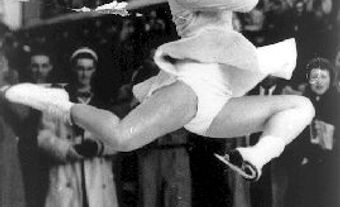This article was originally published in Maclean's Magazine on October 11, 2004
CFL Given New Life
IN THE FREEWHEELING, high-scoring CANADIAN FOOTBALL LEAGUE, games are often decided in the last seconds. The Toronto-Calgary matchup at SkyDome last week wasn't one of those games. The Stampeders fumbled on their first play from scrimmage, and three plays later, running back John Avery - Toronto's key off-season acquisition - slashed into the end zone from four yards out. The Argos scored again on their second possession, an 11-yard toss from quarterback Michael Bishop to Arland Bruce. With the score 14-0 midway through the first quarter, the suspense, if not the game, was over. Calgary, once the perpetual contender, looked disorganized, while the Argos, the league's organizational laughingstock in recent seasons, won easily. "Our defence played well, our special teams played well, and on offence we stuck to the game plan and got the job done," Bishop said. Like it was no big deal.
As on the field, momentum can change quickly in CFL boardrooms. Calgary, once the model franchise, has struggled under owner Michael Feterik and a revolving-door front office. Meanwhile, the Argos' new owners - local businessmen Howard Sokolowski and David Cynamon - bought in a year ago and hired qualified people to run the team. Down the road in Hamilton, another canny businessman, Bob Young, took over the toothless Tiger-Cats last year. Sensible people thought it was crazy buying into the sinkhole CFL teams, but less than a full season later, the new owners are getting results. The Argos are stronger on the field and have increased per-game attendance by 61 per cent over last season. The Tabbies, a woeful 1-17 in 2003, are contending for a playoff spot and play before crowds at Ivor Wynne Stadium that are a whopping 88 per cent bigger than a year ago. Crazy? Maybe not. "Great success would have been increasing attendance by 25 per cent," says Young. "So we are way above where we expected to be at this stage."
That's huge for the CFL. The deadbeat Eastern Conference teams had long jeopardized the league's stability. In particular, the Argos' lousy image in the country's largest media market affected everything from league sponsorships to its TV deals. That image has improved. "There's a buzz around the football team in Toronto, and it's the same in Hamilton," CFL commissioner Tom Wright says. "That hasn't been the case in either city for a long time."
This being the CFL, though, two steps forward are generally accompanied by at least one step back. In Toronto, Cynamon and Sokolowski were broadsided last week when the University of Toronto backed out of a deal to rebuild its Varsity Stadium with the Argos and the Canadian Soccer Association. The downtown site and the 25,000-seat design were popular with fans, but the university pulled the plug, citing escalating costs. That, Sokolowski says, undercuts the new owners' efforts to regain the trust of fans, and forces the Argos to search for another site. They won't rush into anything. "This is not a one-month project for us," he adds. "We're in this for the long term."
There hasn't been a step back in Hamilton, but there are still many things to fix. "The problems that plagued the Ticats in 2003 weren't the result of mistakes made last year," Young says. "They came from 20 years of bad business practices." To operate the team, Young brought in David Sauve, a man with an almost perfect CV. Sauve, who got his economics degree at Harvard, played defensive line for the Ticats in the 1980s, and learned practical business from owning a string of Tim Hortons outlets. In one offseason, Sauve and his staff improved the team, enhanced the fan experience with new promotions and a huge new scoreboard, and got Hamiltonians talking Ticats again. "We're trying to make it fun for fans to go to the football game, regardless of whether the team wins, loses or ties," Young says.
In Toronto, the collapsed stadium deal hurts, but the Argos at least have a decent fallback position. SkyDome doesn't feel so cavernous when there are 25,000 or more fans in the house, and the Argos have averaged 24,254 in six home games this season. The improved attendance isn't due to Cynamon and Sokolowski so much as to the veteran sports executive, Keith Pelley, they hired away from TSN last fall. For the first time in nearly a decade there is front-office stability in Argoland. But it does help to have local owners, the first in more than 30 years, "not because it's us," Sokolowski says, "but because we live here - we're committed to this city."
If the Argos sustain their growing popularity and get a new stadium deal worked out - and skepticism is still a virtue when speculating about the CFL - then league governors can at least begin imagining more ambitious plans. Since he took over as commissioner in 2002, Wright has had placing an expansion franchise in the Maritimes near the top of his to-do list. It would balance the league into two five-team divisions and tap into an unserved fan base. "We have an opportunity to become the Canadian professional sports league," Young says. "The other leagues are all more American than Canadian."
On the concourse outside SkyDome, the Argonauts band serenaded fans streaming out of the stadium after the Calgary game. The playlist was mostly martial, which seemed to hasten the flow of humanity heading for parking lots and bars. But a crowd of maybe 200 formed around the band when it struck up a medley of more listenable tunes. The crowd favourite was a rousing rendition of Henry Mancini's lampshade-on-your-head classic, Tequila. It's been a long time since a mid-week Argo game has been cause for any kind of public demonstrations in Toronto. So when everyone, even people hustling by on their way home, shouted out the one-word chorus, "Tequila!" it was music to the old league's ears.
Maclean's October 11, 2004

 Share on Facebook
Share on Facebook Share on X
Share on X Share by Email
Share by Email Share on Google Classroom
Share on Google Classroom


